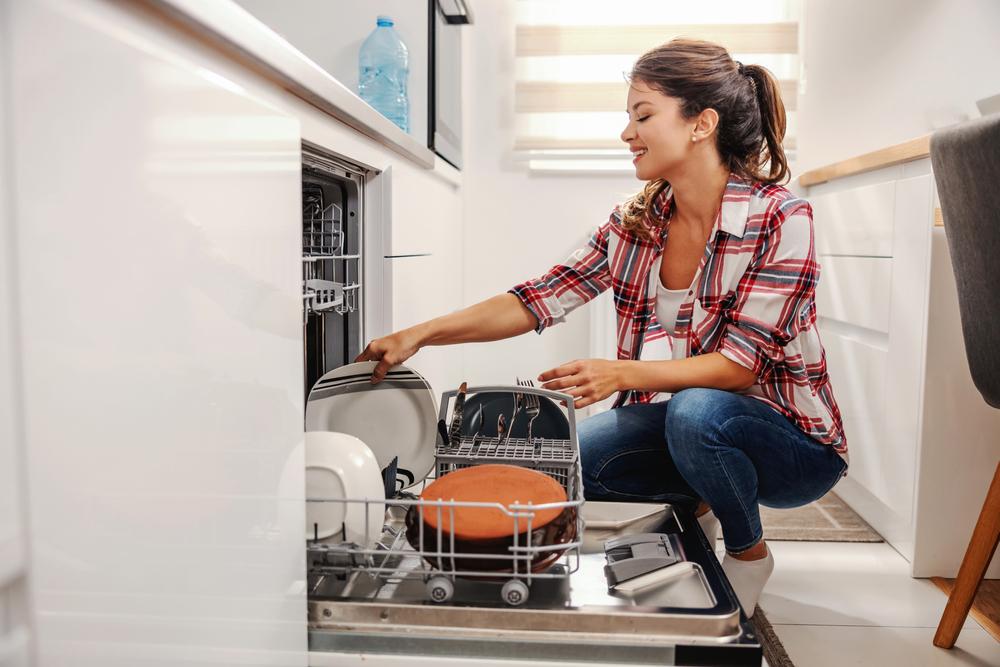You may be curious how I know about all of these mistakes. Well, let’s just say that I’ve made all the mistakes so you won’t have to!
Mistake: You Need to Pre-Rinse
Scrape off all the chunks of food from the dishes, but don’t pre-rinse. It’s not necessary and only wastes time and water. Unless you have particles of food on your dishes, pre-rinsing could actually hinder your dishwasher’s performance. Dishwasher detergent needs the acidity of food to activate its cleaning power. Without that, it can become abrasive to dishes, glassware, and flatware.Mistake: Segregating the Flatware
If your flatware is coming out spotted with visible food stuck on, more than likely it’s a loading problem. Everyday flatware is fine to put in the dishwasher, but it needs to be mixed up, then handles down, with the exception of sharp knives, which should be point-down. This prevents like pieces (spoons and forks) from “nesting” and getting stuck together.Mistake: Not Using Rinse Aid
One of the most common dishwasher mistakes is failing to use a rinse aid, such as Jet-Dry. Some people are completely unaware their machine has a special dispenser compartment just for rinse aid! Check your owner manual so you know where it is and how and when to refill it. Rinse aids allow water to drain after the final rinse and prevent spots and streaks.Mistake: Overloading
It’s tempting to load the dishwasher to infinity and beyond, especially after a big gathering. Here’s the problem: If you pile in too many glasses, dishes, bowls, and all the flatware you own into one load, you'll end up with twice the work because nothing is going to get completely clean. If dishes are blocked and water can’t reach them, then they won’t get clean. The owner’s manual will offer a proper loading diagram for your particular dishwasher configuration. Can’t find it? No worries. Search online. Most every manual is available and easy to find if you have the brand and model number.Mistake: Incorrect Arrangment
You want to be strategic when loading the dishwasher. The dirtiest items go into the center of the bottom rack, facing the spray arm. Once loaded, give that spray arm a spin to make sure it has clear sailing. Then make sure nothing is blocking the detergent dispenser. It needs freedom to open properly at just the right moment.Mistake: Tossing Detergent Pods Into the Machine
Single-dose detergent packs should be placed in the dispenser or, easier, in the flatware basket. Never toss one into the bottom of the dishwasher because it will sit in the hot water, causing it to dissolve prematurely during the pre-wash cycle, then down the drain it goes. That leaves no detergent for the main wash cycle. See how that works? Not very well!Mistake: Mixing Silver and Stainless Steel in the Flatware Basket
If these two dissimilar metals touch in the presence of automatic dishwashing detergent, they can react with each other through electrolysis, which can result in instant pitting and tarnish that will be very difficult to remove. I repeat: very!Mistake: Putting Anything Made of Aluminum in the Dishwasher
When washed in a dishwasher, aluminum sheet pans, cookware, utensils, KitchenAid stand mixer dough hooks, paddles, balloon whisks, or anything else made of anodized aluminum turn dark, dull, and ugly. Aluminum cookware can react and darken due to mineral content in the water, chemicals in the detergent, or high heat from the dryer.As a rule, hand-wash good cutlery, fine china, ceramic cookware, anything aluminum, anything wood, fine crystal barware, stemware, sterling silver, and silver-plate items that are too delicate for the typical automatic dishwasher.





